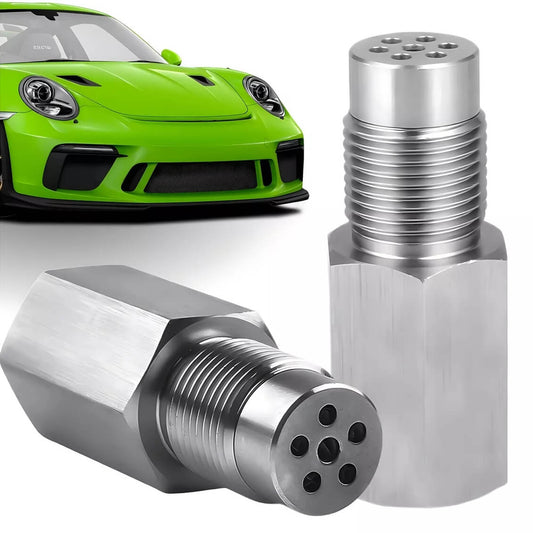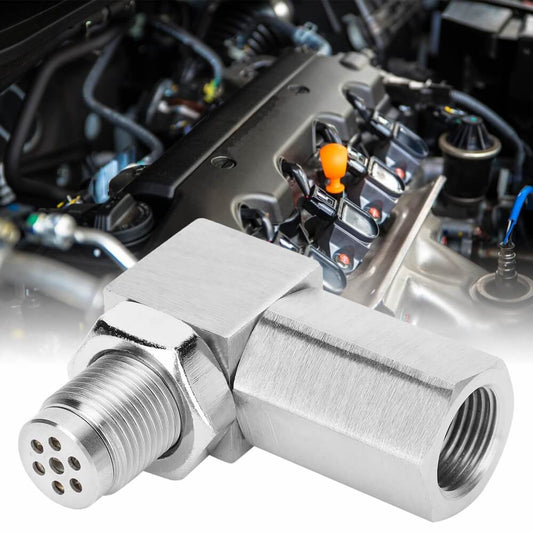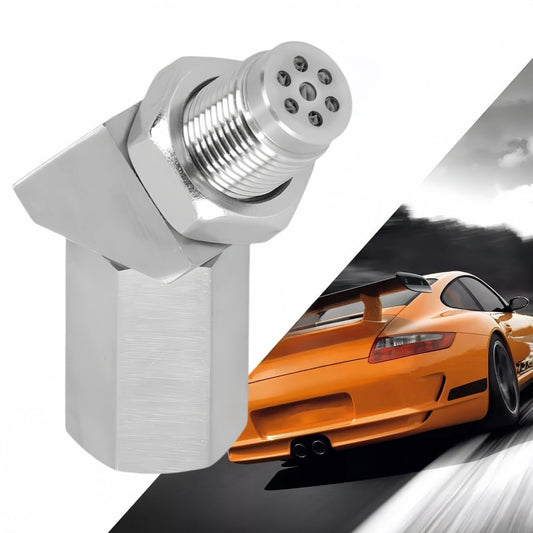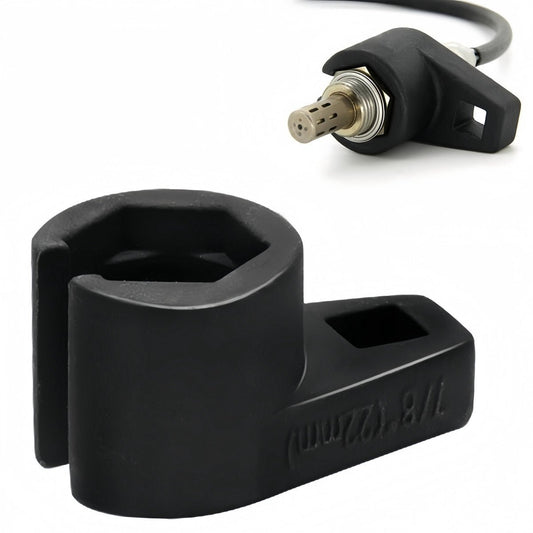Análisis en profundidad de los códigos de problemas P0420 y P0430: por qué su automóvil necesita el Mini Catalizador
Compartir
Los códigos P0420 y P0430 son códigos de problemas comunes en la industria automotriz, generalmente relacionados con el rendimiento del convertidor catalítico, especialmente después de modificaciones en el sistema de escape. La aparición de estos códigos significa que la unidad de control del motor (ECU) del vehículo ha detectado un problema en el sistema de escape, a menudo porque el rendimiento del convertidor catalítico no cumple con los estándares requeridos. Sin embargo, comprender las causas fundamentales detrás de estos códigos de problemas es clave para resolver el problema.

Causas comunes de los códigos de problemas P0420 y P0430
1. Sensor de oxígeno trasero defectuoso:
Los códigos de problemas P0420 y P0430 suelen ser provocados por un sensor de oxígeno trasero defectuoso (ubicado aguas abajo del convertidor catalítico). Normalmente, la función del sensor de oxígeno trasero es controlar la eficiencia del convertidor catalítico. Compara la concentración de oxígeno detectada por el sensor de oxígeno delantero (ubicado aguas arriba del convertidor catalítico) con la del sensor trasero. Si las lecturas de ambos sensores son similares, la ECU supone que el convertidor catalítico no está funcionando correctamente, lo que podría activar los códigos P0420 o P0430.
2. Modificaciones del sistema de escape:
Si su vehículo ha sido sometido a una modificación del sistema de escape, como reemplazar el convertidor catalítico por un convertidor catalítico de alto flujo, instalar un tubo de prueba o quitar el convertidor catalítico por completo (escape sin catalizador), esto puede afectar directamente el flujo y la temperatura del escape. Los sistemas de escape modificados a menudo dan como resultado temperaturas de escape más altas o un flujo de escape no coincidente en comparación con el sistema original, lo que hace que el sensor de oxígeno trasero detecte señales anormales.
3. Disminución de la eficiencia del convertidor catalítico:
Durante las modificaciones, es posible que se le quite o reemplace el convertidor catalítico al vehículo, y es posible que los nuevos convertidores catalíticos de alto flujo no mantengan el mismo nivel de eficiencia de conversión de gases de escape que los originales. Si la eficiencia del convertidor catalítico disminuye, el sensor de oxígeno trasero detectará niveles más altos de sustancias nocivas en los gases de escape, lo que activará los códigos P0420 o P0430.
4. Problemas de posición del sensor:
La posición del sensor de oxígeno es otra causa común de los códigos P0420 y P0430. Es posible que los sistemas de escape modificados no tengan en cuenta la ubicación del sensor, lo que hace que el sensor quede expuesto a un calor o flujo de escape excesivos. En tales casos, el sensor de oxígeno puede medir señales inexactas, lo que hace que la ECU realice un juicio incorrecto y active los códigos de problemas.
5. Informes falsos de la ECU:
En algunos casos, incluso si el sistema de escape modificado no afecta el funcionamiento real del convertidor catalítico, la ECU puede activar los códigos de falla debido a lecturas anormales del sensor de oxígeno. Esto es especialmente común en vehículos que han sido sometidos a ajustes de la ECU o actualizaciones de software.
Cómo el minicatalizador resuelve los códigos P0420 y P0430
Una vez que entendemos las causas fundamentales de estos códigos de problemas, podemos apreciar mejor cómo el Mini Catalizador aborda eficazmente estos problemas.
1. Cómo mover el sensor de oxígeno para evitar señales anormales
El Mini Catalizador funciona reubicando el sensor de oxígeno para evitar la exposición directa al flujo de escape sobrecalentado. Cuando se modifica el sistema de escape, el sensor de oxígeno trasero puede recibir señales inexactas, lo que genera los códigos P0420 o P0430. El Mini Catalizador aleja el sensor de oxígeno del contacto directo con el flujo de escape, lo que garantiza que lea señales más estables y precisas.
2. Mini convertidor catalítico incorporado para simular la función de fábrica
La principal ventaja del Mini Catalizador radica en su mini convertidor catalítico integrado. Este convertidor catalítico cuenta con una estructura de panal de cerámica recubierta de catalizadores de platino, paladio y rodio, que promueven eficazmente la conversión de gases nocivos. De esta manera, el Mini Catalizador no solo cambia la posición del sensor de oxígeno, sino que también simula la función de un convertidor catalítico tradicional, asegurando que los gases de escape detectados por el sensor de oxígeno trasero sean consistentes con los que detectaría un convertidor catalítico de fábrica, evitando así la activación de los códigos P0420 y P0430.
3. Ofrecer una solución económica para reducir los costes de reparación
En comparación con los métodos de reparación tradicionales, como la sustitución del convertidor catalítico, los costes de instalación y tiempo del Mini Catalizador son significativamente menores. No requiere soldadura ni modificaciones eléctricas; simplemente se puede instalar en la ubicación del sensor de oxígeno trasero, lo que ahorra costes de reparación. Para los propietarios de vehículos con sistemas de escape modificados, el Mini Catalizador ofrece una solución económica y eficiente.
4. Alta eficiencia y durabilidad, adecuado para diversos sistemas de escape modificados.
El Mini Catalizador está fabricado en acero inoxidable T-304, que es resistente al calor y a la corrosión, lo que garantiza un rendimiento estable en condiciones de temperaturas y presiones de escape extremas. Esto evita los problemas comunes de corrosión y fallas asociados con los materiales de acero inoxidable tradicionales. Como tal, es adecuado para varios sistemas de escape modificados, incluidos convertidores catalíticos de alto flujo, tubos de prueba y sistemas de escape completamente sin catalizador.
Resumen: Ventajas del Mini Catalizador
Resuelve los códigos P0420 y P0430: al cambiar la posición del sensor de oxígeno y simular la función del convertidor catalítico, evita la activación de códigos de problemas.
Instalación sencilla, bajo costo: no requiere soldadura ni modificaciones eléctricas; el proceso de instalación es simple y rápido, lo que permite ahorrar costos de reparación.
Conversión eficiente de gases de escape: el mini convertidor catalítico incorporado reduce eficazmente las emisiones nocivas y mejora el rendimiento del motor.
Adecuado para varios sistemas de escape modificados: admite convertidores catalíticos de alto flujo, tubos de prueba y otras modificaciones de escape, con amplia compatibilidad.
Material resistente a la corrosión y a altas temperaturas: fabricado en acero inoxidable T-304, lo que garantiza un funcionamiento estable a largo plazo y resistencia a la corrosión.
Si su vehículo muestra los códigos de problemas P0420 o P0430 y ha modificado el sistema de escape, el Mini Catalizador es su solución ideal. No solo resuelve eficazmente estos códigos de problemas, sino que también optimiza el rendimiento del escape y mejora la experiencia de conducción.

Causas comunes de los códigos de problemas P0420 y P0430
1. Sensor de oxígeno trasero defectuoso:
Los códigos de problemas P0420 y P0430 suelen ser provocados por un sensor de oxígeno trasero defectuoso (ubicado aguas abajo del convertidor catalítico). Normalmente, la función del sensor de oxígeno trasero es controlar la eficiencia del convertidor catalítico. Compara la concentración de oxígeno detectada por el sensor de oxígeno delantero (ubicado aguas arriba del convertidor catalítico) con la del sensor trasero. Si las lecturas de ambos sensores son similares, la ECU supone que el convertidor catalítico no está funcionando correctamente, lo que podría activar los códigos P0420 o P0430.
2. Modificaciones del sistema de escape:
Si su vehículo ha sido sometido a una modificación del sistema de escape, como reemplazar el convertidor catalítico por un convertidor catalítico de alto flujo, instalar un tubo de prueba o quitar el convertidor catalítico por completo (escape sin catalizador), esto puede afectar directamente el flujo y la temperatura del escape. Los sistemas de escape modificados a menudo dan como resultado temperaturas de escape más altas o un flujo de escape no coincidente en comparación con el sistema original, lo que hace que el sensor de oxígeno trasero detecte señales anormales.
3. Disminución de la eficiencia del convertidor catalítico:
Durante las modificaciones, es posible que se le quite o reemplace el convertidor catalítico al vehículo, y es posible que los nuevos convertidores catalíticos de alto flujo no mantengan el mismo nivel de eficiencia de conversión de gases de escape que los originales. Si la eficiencia del convertidor catalítico disminuye, el sensor de oxígeno trasero detectará niveles más altos de sustancias nocivas en los gases de escape, lo que activará los códigos P0420 o P0430.
4. Problemas de posición del sensor:
La posición del sensor de oxígeno es otra causa común de los códigos P0420 y P0430. Es posible que los sistemas de escape modificados no tengan en cuenta la ubicación del sensor, lo que hace que el sensor quede expuesto a un calor o flujo de escape excesivos. En tales casos, el sensor de oxígeno puede medir señales inexactas, lo que hace que la ECU realice un juicio incorrecto y active los códigos de problemas.
5. Informes falsos de la ECU:
En algunos casos, incluso si el sistema de escape modificado no afecta el funcionamiento real del convertidor catalítico, la ECU puede activar los códigos de falla debido a lecturas anormales del sensor de oxígeno. Esto es especialmente común en vehículos que han sido sometidos a ajustes de la ECU o actualizaciones de software.
Cómo el minicatalizador resuelve los códigos P0420 y P0430
Una vez que entendemos las causas fundamentales de estos códigos de problemas, podemos apreciar mejor cómo el Mini Catalizador aborda eficazmente estos problemas.
1. Cómo mover el sensor de oxígeno para evitar señales anormales
El Mini Catalizador funciona reubicando el sensor de oxígeno para evitar la exposición directa al flujo de escape sobrecalentado. Cuando se modifica el sistema de escape, el sensor de oxígeno trasero puede recibir señales inexactas, lo que genera los códigos P0420 o P0430. El Mini Catalizador aleja el sensor de oxígeno del contacto directo con el flujo de escape, lo que garantiza que lea señales más estables y precisas.
2. Mini convertidor catalítico incorporado para simular la función de fábrica
La principal ventaja del Mini Catalizador radica en su mini convertidor catalítico integrado. Este convertidor catalítico cuenta con una estructura de panal de cerámica recubierta de catalizadores de platino, paladio y rodio, que promueven eficazmente la conversión de gases nocivos. De esta manera, el Mini Catalizador no solo cambia la posición del sensor de oxígeno, sino que también simula la función de un convertidor catalítico tradicional, asegurando que los gases de escape detectados por el sensor de oxígeno trasero sean consistentes con los que detectaría un convertidor catalítico de fábrica, evitando así la activación de los códigos P0420 y P0430.
3. Ofrecer una solución económica para reducir los costes de reparación
En comparación con los métodos de reparación tradicionales, como la sustitución del convertidor catalítico, los costes de instalación y tiempo del Mini Catalizador son significativamente menores. No requiere soldadura ni modificaciones eléctricas; simplemente se puede instalar en la ubicación del sensor de oxígeno trasero, lo que ahorra costes de reparación. Para los propietarios de vehículos con sistemas de escape modificados, el Mini Catalizador ofrece una solución económica y eficiente.
4. Alta eficiencia y durabilidad, adecuado para diversos sistemas de escape modificados.
El Mini Catalizador está fabricado en acero inoxidable T-304, que es resistente al calor y a la corrosión, lo que garantiza un rendimiento estable en condiciones de temperaturas y presiones de escape extremas. Esto evita los problemas comunes de corrosión y fallas asociados con los materiales de acero inoxidable tradicionales. Como tal, es adecuado para varios sistemas de escape modificados, incluidos convertidores catalíticos de alto flujo, tubos de prueba y sistemas de escape completamente sin catalizador.
Resumen: Ventajas del Mini Catalizador
Resuelve los códigos P0420 y P0430: al cambiar la posición del sensor de oxígeno y simular la función del convertidor catalítico, evita la activación de códigos de problemas.
Instalación sencilla, bajo costo: no requiere soldadura ni modificaciones eléctricas; el proceso de instalación es simple y rápido, lo que permite ahorrar costos de reparación.
Conversión eficiente de gases de escape: el mini convertidor catalítico incorporado reduce eficazmente las emisiones nocivas y mejora el rendimiento del motor.
Adecuado para varios sistemas de escape modificados: admite convertidores catalíticos de alto flujo, tubos de prueba y otras modificaciones de escape, con amplia compatibilidad.
Material resistente a la corrosión y a altas temperaturas: fabricado en acero inoxidable T-304, lo que garantiza un funcionamiento estable a largo plazo y resistencia a la corrosión.
Si su vehículo muestra los códigos de problemas P0420 o P0430 y ha modificado el sistema de escape, el Mini Catalizador es su solución ideal. No solo resuelve eficazmente estos códigos de problemas, sino que también optimiza el rendimiento del escape y mejora la experiencia de conducción.





